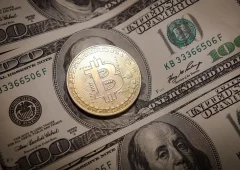Ripple Launches New Brazilian Real-Pegged Stablecoin on XRPL
21.02.2025 12:00 2 min. read Kosta Gushterov
Ripple has teamed up with Brazil’s Braza Group to introduce a new stablecoin, BBRL, on the XRP Ledger.
Pegged to the Brazilian Real, the asset aims to enhance digital transactions for both individuals and businesses by leveraging XRPL’s speed and efficiency.
Braza Group, a key player in Brazil’s banking sector, highlighted BBRL’s role in improving financial accessibility. CEO Marcelo Sacomori emphasized the project’s commitment to security and compliance, positioning the stablecoin as a tool for reducing volatility and streamlining operations. Backed by Braza Bank, BBRL is expected to expand cross-border payment efficiency and unlock new financial opportunities, according to Ripple’s Markus Infanger.
Beyond stablecoins, Braza Group is also engaging in Brazil’s DREX project, an initiative led by the country’s central bank to explore blockchain applications. The company has proposed multiple use cases, including CBDC exchanges and asset tokenization, as part of its broader push toward digital finance.
BBRL is set for a phased rollout in early 2025, starting with institutional clients before reaching retail users via the Braza On app. Sacomori envisions the stablecoin strengthening market liquidity while paving the way for new global settlement mechanisms. By the end of next year, Braza Group aims to secure a 30% market share in Brazil’s stablecoin sector, anticipating stablecoins’ growing importance in international finance.
Meanwhile, Brazil has become the first country to approve an XRP spot ETF. Managed by Hashdex and Genial Investimentos, the fund will be listed on the country’s B3 stock exchange, signaling increased institutional interest in digital assets.
-
1
Fiserv to Launch FIUSD Stablecoin Across Its Massive Banking Network
23.06.2025 21:00 1 min. read -
2
Mastercard Integrates Chainlink to Power Direct Crypto Access for Cardholders
25.06.2025 18:00 1 min. read -
3
Robinhood to Launch Tokenized Shares of OpenAI and SpaceX for European Users
01.07.2025 11:00 2 min. read -
4
BIS Slams Stablecoins, Calls Them Ill-Suited for Modern Monetary Systems
26.06.2025 9:00 1 min. read -
5
Robinhood Expands Crypto Futures With XRP and Solana Micro Contracts
28.06.2025 13:00 2 min. read
Emirates to Integrate Crypto.com Pay in 2025: A New Era of Airline Payments
Emirates Airline has taken a bold step toward embracing digital finance by signing a Memorandum of Understanding (MoU) with leading cryptocurrency platform Crypto.com.
Volkswagen Taps Solana-Based Service for Real-Time Robotaxi Navigation
Volkswagen’s autonomous driving division, Volkswagen ADMT, has announced a data-sharing partnership with Bee Maps, a cutting-edge spatial intelligence service built on the Solana blockchain.
Dubai Approves First Tokenized Money Market Fund
The Dubai Financial Services Authority (DFSA) has given the green light to the QCD Money Market Fund (QCDT), making it the first officially approved tokenized money market fund within the Dubai International Financial Centre (DIFC).
Bitget Wallet Teams Up with Mastercard to Launch Crypto-Powered Payment Card
Bitget Wallet has entered a strategic partnership with Mastercard and Web3 payment provider Immersve to launch a new payment card that allows users to spend cryptocurrencies directly from their digital wallets.
-
1
Fiserv to Launch FIUSD Stablecoin Across Its Massive Banking Network
23.06.2025 21:00 1 min. read -
2
Mastercard Integrates Chainlink to Power Direct Crypto Access for Cardholders
25.06.2025 18:00 1 min. read -
3
Robinhood to Launch Tokenized Shares of OpenAI and SpaceX for European Users
01.07.2025 11:00 2 min. read -
4
BIS Slams Stablecoins, Calls Them Ill-Suited for Modern Monetary Systems
26.06.2025 9:00 1 min. read -
5
Robinhood Expands Crypto Futures With XRP and Solana Micro Contracts
28.06.2025 13:00 2 min. read


